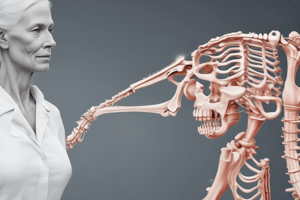Podcast
Questions and Answers
What is osteoporosis?
What is osteoporosis?
Osteoporosis is a systemic skeletal disorder characterized by low bone mass and increased bone fragility.
What is osteoporosis characterized by?
What is osteoporosis characterized by?
- Low bone mass and high bone fragility (correct)
- High bone mass and high bone fragility
- Low bone mass and low bone fragility
- High bone mass and low bone fragility
What is osteoporosis?
What is osteoporosis?
- A cardiovascular disorder characterized by high bone mass and decreased bone fragility
- A skeletal disorder characterized by high bone mass and increased bone fragility
- A systemic disorder characterized by low bone mass and increased bone fragility (correct)
- A muscular disorder characterized by low bone mass and decreased bone fragility
What are the two types of bone cells mentioned in the text?
What are the two types of bone cells mentioned in the text?
What are the two types of bone cells mentioned in the text?
What are the two types of bone cells mentioned in the text?
What are the two types of bone cells involved in bone remodeling?
What are the two types of bone cells involved in bone remodeling?
What is BMD and how is it measured?
What is BMD and how is it measured?
What is BMD?
What is BMD?
What is the recommended screening test for osteoporosis?
What is the recommended screening test for osteoporosis?
What T-score indicates osteoporosis?
What T-score indicates osteoporosis?
What are the basic bone health measures for preventing osteoporosis?
What are the basic bone health measures for preventing osteoporosis?
What are some basic bone health measures for preventing osteoporosis?
What are some basic bone health measures for preventing osteoporosis?
What are the indications for screening for osteoporosis?
What are the indications for screening for osteoporosis?
What are some indications for screening for osteoporosis?
What are some indications for screening for osteoporosis?
What are some basic bone health measures for osteoporosis?
What are some basic bone health measures for osteoporosis?
What are some indications for osteoporosis screening?
What are some indications for osteoporosis screening?
Which biochemical tests are recommended for osteoporosis screening?
Which biochemical tests are recommended for osteoporosis screening?
What biochemical tests are recommended for screening for osteoporosis?
What biochemical tests are recommended for screening for osteoporosis?
How is risk stratification for osteoporosis based?
How is risk stratification for osteoporosis based?
What is the basis for risk stratification in osteoporosis?
What is the basis for risk stratification in osteoporosis?
What are some recommended biochemical tests for osteoporosis?
What are some recommended biochemical tests for osteoporosis?
What are some non-pharmacological therapies for treating osteoporosis?
What are some non-pharmacological therapies for treating osteoporosis?
How is risk stratification for osteoporosis based?
How is risk stratification for osteoporosis based?
What are the non-pharmacological therapies for osteoporosis?
What are the non-pharmacological therapies for osteoporosis?
What are some pharmacological therapies for treating osteoporosis?
What are some pharmacological therapies for treating osteoporosis?
Which pharmacological therapies are used for osteoporosis?
Which pharmacological therapies are used for osteoporosis?
What are some non-pharmacological therapies for osteoporosis?
What are some non-pharmacological therapies for osteoporosis?
What are some pharmacological therapies for osteoporosis?
What are some pharmacological therapies for osteoporosis?
What are the contraindications for bisphosphonates?
What are the contraindications for bisphosphonates?
What are some contraindications for bisphosphonates?
What are some contraindications for bisphosphonates?
What is the tool used for calculating 10-year fracture risk in osteoporosis?
What is the tool used for calculating 10-year fracture risk in osteoporosis?
What are some contraindications for bisphosphonates?
What are some contraindications for bisphosphonates?
What tool is used to calculate the 10-year fracture risk for osteoporosis?
What tool is used to calculate the 10-year fracture risk for osteoporosis?
What is the role of osteoblasts and osteoclasts in bone health?
What is the role of osteoblasts and osteoclasts in bone health?
What is the T-score indicating osteoporosis?
What is the T-score indicating osteoporosis?
What is the T-score used for in diagnosing osteoporosis?
What is the T-score used for in diagnosing osteoporosis?
Flashcards are hidden until you start studying
Study Notes
Overview of Osteoporosis, Bone Cells, and BMD:
- Osteoporosis is a systemic skeletal disorder characterized by low bone mass and increased bone fragility.
- Bone cells include osteoblasts and osteoclasts, which respond to different hormones.
- BMD is measured via DXA scan and a T-score of less than -2.5 indicates osteoporosis.
Screening and Diagnosis of Osteoporosis:
- Basic bone health measures include exercise, calcium and vitamin D intake, and fall prevention.
- Fragility fractures, risk factors, and secondary osteoporosis are indications for screening.
- Recommended biochemical tests include serum calcium, vitamin D, and CBC.
- Risk stratification is based on the 10-year fracture risk, calculated using the CAROC tool or FRAX questionnaire.
Treatment of Osteoporosis:
- Non-pharmacological therapies include exercise, lifestyle changes, and calcium and vitamin D supplementation.
- Pharmacological therapies include bisphosphonates, denosumab, and other agents.
- Contraindications for bisphosphonates include denosumab therapy, pregnancy, and CKD.
Studying That Suits You
Use AI to generate personalized quizzes and flashcards to suit your learning preferences.




